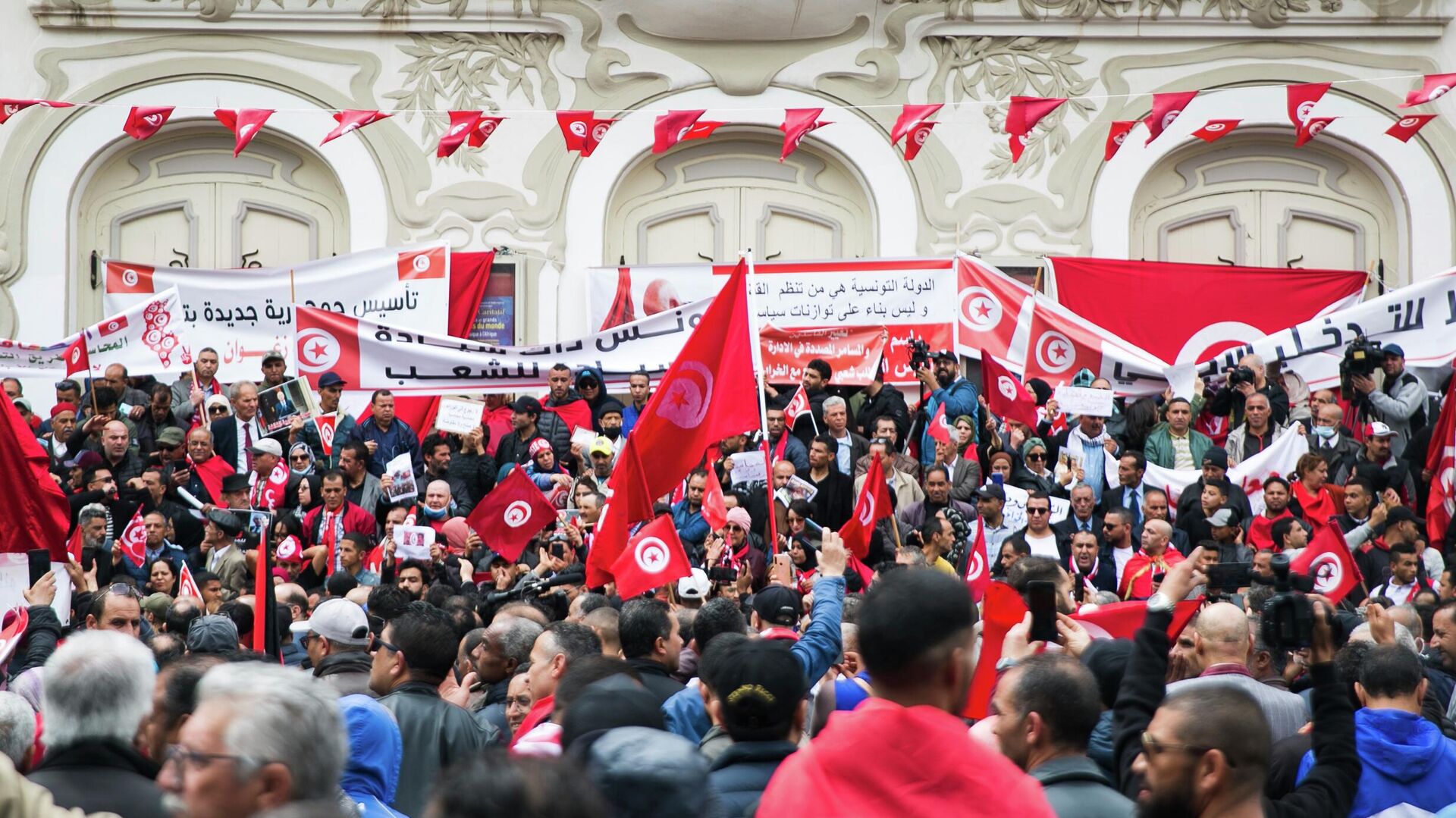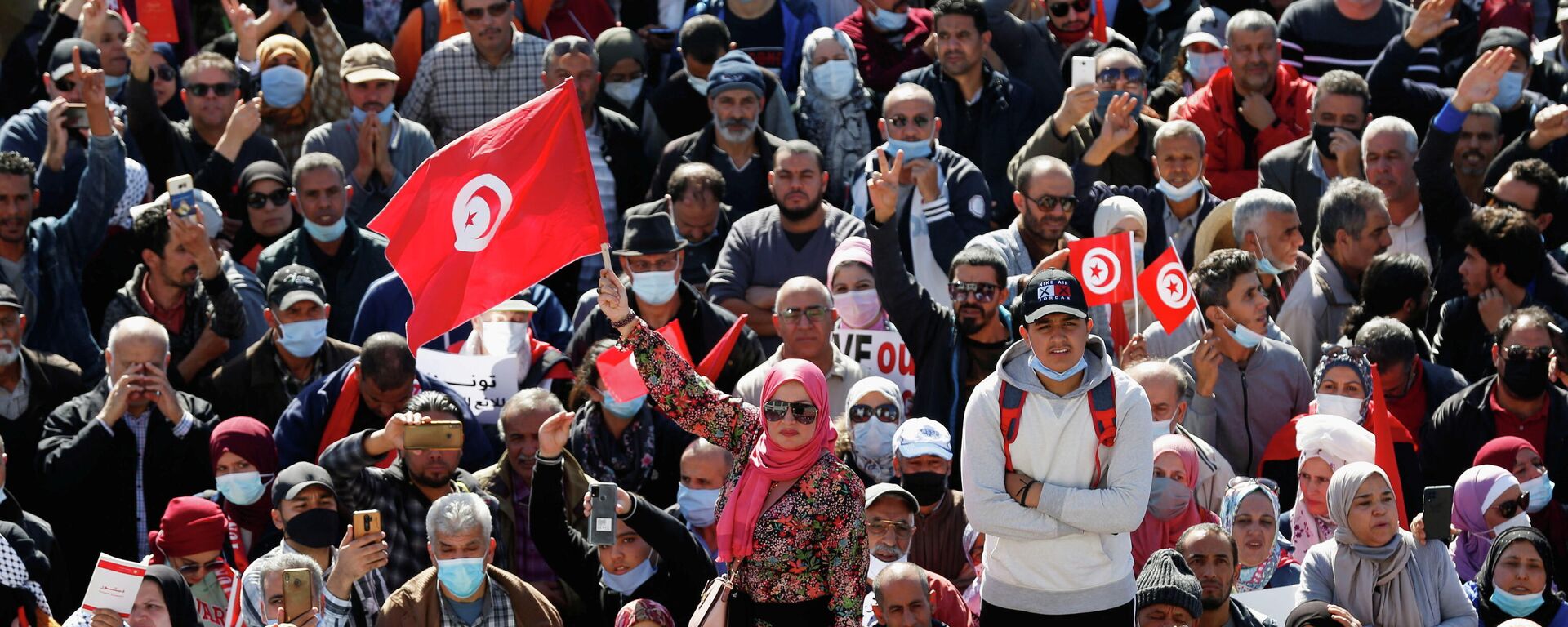Tunisians Rally Against ‘Corrupted’ Opposition, in Support of President Saied
22:25 GMT 08.05.2022 (Updated: 11:04 GMT 24.11.2022)

© AP Photo / Hassene Dridi
Subscribe
Tunisian President Kais Saied is close to consolidating his power over the country. Although it has angered much of the political establishment, he remains popular among the masses, who have grown frustrated by economic stagnation and government paralysis after the Arab Spring revolution of 2011.
On Sunday, hundreds of Tunisians took to the streets of the country’s capital, Tunis, to protest in support of President Kais Saied.
The demonstrators claim that opposition supporters are corrupt and called on the government to ban opposition parties. Tunisians gathered in the capital's central Bourguiba Avenue, chanting “Traitors should be accountable,” while holding banners that read, “We are all Kais Saied.”
“Our message is clear: we ask Saied to arrest the corrupt ... the future is not for parties,” Ahmed Hammami, who organized Sunday’s demonstration, said as cited by Al Arabiya.
A protest stand for supporters of the President of the Republic, Kais Said, to demand accountability and reject foreign interference.#Tunisie #Tunis pic.twitter.com/d3Y36jhl1m
— Eya Mkaddem (@EMkaddem) May 8, 2022
المئات في تونس يطالبون بتحقيق أهداف "مسار 25 يوليو"
— محمود (أبو زياد) (@AbuZiad486) May 8, 2022
طالب المئات من أنصار الرئيس التونسي قيس سعيد، الأحد، بتحقيق أهداف "مسار 25 يوليو"، و"محاسبة الفاسدين".
وشارك المئات في وقفة بشارع "الحبيب بورقيبة" وسط العاصمة #تونس، بدعوة من "حراك 25 يوليو" (داعم للرئيس سعيد). pic.twitter.com/V0cmVpdvDB
Earlier in the week, Kais Saied announced the formation of a special committee that would work on the country’s new Constitution. The planned amendments were said to infringe on the democratic principles, brought by the revolution of 2011, and establish a regime of almost one-man rule in the country. The announcement has triggered mass protests, led by the country’s opposition.
President Saied also issued a decree last month, giving himself special powers to appoint the head of the Independent High Authority for Elections and three of its seven members. It was seen by some as a move to seize control over the process of counting votes ahead of the referendum, scheduled for July 25, and guaranteeing the adoption of the amendments.
According to the current head of Authority, Nabil Baffoun, Saied's decisions can be considered as the “establishment of a dictatorship” that will be legitimized after the amendments to the Constitution is voted on July 25.
Saied has adopted a number of similar measures to limit the powers of the judicial and legislative branches of the Tunisian government. At the end of July 2021, when Ennahda, an Islamist party, held a majority and was in the position to appoint a new prime minister, Saied assumed additional powers when he dismissed the prime minister and suspended parliament. In March 2022, Saied went one step further and dissolved parliament.
He also dissolved the Superior Council of the Judiciary, replacing it with a “provisional” judicial oversight body, whose members he appointed himself.
Analysts believe the secular population of Tunisia remains Saied’s main base of support, as they have become disappointed with the results of the “Jasmine Revolution” of 2011. The coup, which was intended to establish a democratic regime in the country, has given way to broad Islamist powers, like Ennahda, while several secular parties have become alienated from the political life.

